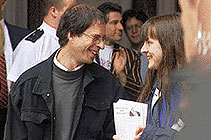|
|
|
|
McLibel:
Two Worlds Collide
|
 |
|
Sharon Beder's book Global Spin provides a sobering account of the methods that multi-national corporations use to silence any questioning of their goals and methods. Particularly effective is the use of libel suits – backed up by vast legal and monetary resources – to persuade those with a public forum to hastily withdraw their criticisms. Where Beder's book is depressing in its overall effect, the television documentary McLibel: Two Worlds Collide seizes on the one case that offers a glimmer of hope to concerned citizens and activists. In 1994, Helen Steel and Dave Morris were taken to court by the McDonalds corporation for distributing a pamphlet titled "What's Wrong with McDonalds?" By the end of 1996 it had become the longest running trial in English legal history. The two worlds of the title are vividly juxtaposed. Where McDonalds had the administrative might to sustain an intricate daily defence of their operations, Helen and Dave (who represented themselves) are seen lugging their files to court on the train, tired and stressed. They are an intriguing pair. Franny Armstrong's doco backtracks to the period in the '80s when they separately joined a small activist group. Their leftist politics are played down – presumably so as not to alienate viewers suspicious of ideological extremism. But while Dave and Helen are unquestionably underdogs of the kind that power old Frank Capra movies, they resist being turned into just another human interest story on the nightly television news. Their rage is always muted. They dismiss their personal problems as trivial in view of the big picture. Dave insists half way through the doco: "There's no sex angle, I'm afraid." Like these valiant fighters, Armstrong concentrates attention on the facts and issues of the case. Her presentation of the material is clear and lucid, methodically working through five major topics: nutrition, consumer deception, manipulation of children, employment conditions and treatment of the environment. Where any other doco would have held viewers in suspense by mimicking the chronology of the case and leaving the judge's verdict until the end, this one patiently explains from beginning the successes and failures of the activists' efforts. It has become de rigueur for critics to suspect every new documentary of being unbalanced or incomplete in its argument, that it fails to fairly represent all sides. McLibel is patently partial in its championing of Dave and Helen against a big, bad corporation. But, considering that free speech is under so much threat, and that the multi-nationals can buy all the prime-time media access they will ever need, this bias is cause for celebration. © Adrian Martin October 1999 |
![]()